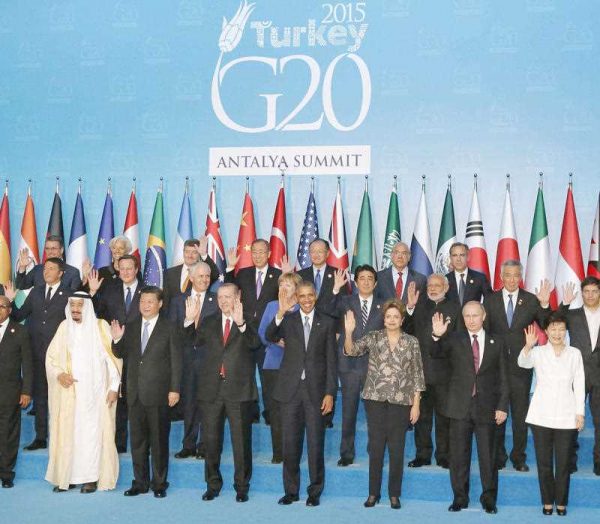The roots of globalisation lay in the quest for empire. The combination of church and state meant that some of the early attempts at global governance were through religious institutions, such as the Papacy and the Caliphate.
The European Enlightenment and technological revolutions made the world more secular and intensified globalising forces. The Concert of Europe, following the Napoleonic Wars, was the first secular attempt at global governance. It broke down because extant European powers could not accommodate a rising power. Germany was integrated into global governance only after two catastrophic world wars.
Participation in global governance in the industrial era hinges on economic size, itself predicated on a combination of population size and the level of industrialisation. On these grounds, Germany, Canada and Japan became members of the G7, rather than old maritime powers like Spain and Portugal, or mighty agrarian empires such as China and India. But G7 members shared other attributes. They had high per capita incomes, were open economies and societies, and were technologically dynamic. At the core of the G7 Charter of 1975 was the notion of ‘shared beliefs and responsibilities’.
Beginning in the 1970s, growth in several ‘developing countries’ accelerated, even as it started moderating in G7 countries. Mostly middle-income countries, their aggregate GDP now matches those of G7 countries. China and India may soon rival the United States in aggregate GDP, with Brazil, Indonesia and Nigeria following close behind. So how can these emerging economic powers be integrated into the institutions of global governance?
The G7, like the concert, is a nimble, informal institution dominated by summits where leaders sit across the table to thrash out global issues. But the formal, treaty-based inclusive institutions of global governance that formulate the rules of global engagement — such as the UN, the WTO, the IMF, the World Bank, the United Nations Framework Convention on Climate Change, the Bank for International Settlements and the Financial Stability Board — are slow-moving bureaucratic silos that are devoted to their own single objectives.
Despite their inclusive membership, they are mostly dominated by the G7, through special bodies (such as the UN Security Council) or through shareholding structures. Existing powers are reluctant to cede power to the rising powers. And these formal institutions are consequently losing their legitimacy, as the rising powers are increasingly unwilling to abide by rules that are set by G7 countries.
This has created a crisis in global governance as formal treaty-based institutions are becoming dysfunctional. This crisis is reflected in stalemates in multilateral trade and climate change negotiations on the one hand, and the rise of plurilateral arrangements — such as the Trans-Pacific Partnership (TPP), the Transatlantic Trade and Investment Partnership (TTIP) and the BRICS (Brazil, Russia, India, China and South Africa) grouping — on the other.
Where do we go from here and can history be a guide?
The experience with Germany in the late 19th and early 20th centuries is a warning from history regarding the perils of not accommodating rising powers within institutions of global governance. Recognising this, the G7 reached out to co-opt major developing nations — especially the BRICS — into the informal global economic governance structure through the Heiligendamm process and, more recently, by upgrading the G20 to summit level. But further accommodation will hinge on the ability of the rising powers to escape the middle income trap. They can do only this by rebalancing their economies away from dependence on external demand in the G7 economies and towards internal engines of growth.
In its present form, the G20 works as a coalition of pressure groups such as the G7, BRICS and MIKTA (Mexico, Indonesia, South Korea, Turkey and Australia). Only the G7 has a sense of shared responsibility. The BRICS still believe in ‘common but differentiated responsibilities’ that puts the onus on the G7 for equitable and optimal global outcomes. The rising powers are united not through any G7 notion of ‘shared beliefs and responsibilities’ but through opposition to extant superpowers as they all compete for the pole position in the new order.
Formal institutions need to reflect the informal governance structure. The G20 also needs to be strengthened to encompass non-economic issues. The shift in focus of the Antalya Summit, held in the shadow of the terror attacks in Paris, assumes special significance in this regard. It could otherwise become dysfunctional and irrelevant as the emerging powers lose interest and form their own parallel institutions, instead of taking greater responsibility for global outcomes through the G20.
The fragmentation of global governance has already begun. Chinese efforts on Chiang Mai Initiative Multilateralization, the Asian Infrastructure Investment Bank and the New Silk Road have kick-started the process. BRICS initiatives on the New Development Bank and the Contingent Reserve Arrangement, as well as US initiatives on the TPP and the TTIP have exacerbated this fragmentation.
Postwar institutions of global governance have been dominated by powers that believed in open markets, open societies and internationalisation. The emerging powers believe in keeping international markets open, as their economic rise is predicated on them, but few are open societies and they are all highly nationalistic. To complicate matters, civil society groups in G7 countries, increasingly see themselves as victims of globalisation.
The resolution of these frictions is likely to shape the future of global governance.
Alok Sheel is the Additional Chief Secretary in the provincial government of Kerala. He was previously the Secretary of the Prime Minister’s Economic Advisory Council, India.
A version of this article was first published here on MINT.

